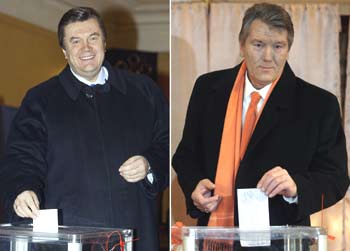 Ukraine’s parliament appointed pro-Russian Viktor Yanukovych (pictured left) as Prime Minister last week. The appointment was a compromise after a four month political crisis. The stand-off ended after arch rival and pro-Western President Viktor Yushchenko (pictured right) finally agreed to share power after Yanukovych signed a pact aimed at preserving key areas of the president's policies.
Ukraine’s parliament appointed pro-Russian Viktor Yanukovych (pictured left) as Prime Minister last week. The appointment was a compromise after a four month political crisis. The stand-off ended after arch rival and pro-Western President Viktor Yushchenko (pictured right) finally agreed to share power after Yanukovych signed a pact aimed at preserving key areas of the president's policies. Ukraine has been in political turmoil since a parliamentary ballot in March in which no party won a majority, although Mr Yanukovych's Party of Regions polled the most votes. The country is split geographical with Yanukovych drawing his support from the mainly Russian-speaking industrial south-east of Ukraine. In this part of the country, many voters are suspicious of the pro-Western agenda. Although the Party of Regions won the election, they did not win enough seats to form an outright government. With the help of the smaller Socialist Party, they were the leading party in the new parliament. President Yushchenko then had to decide whether he would nominate Yanukovych as prime minister, or call for fresh elections.
It represents a stunning comeback for the 56 year old Yanukovych whose fraud-tainted 2004 presidential victory was turned back by the Orange Revolution. Yushchenko eventually won the second round of that election after a Supreme Court-ordered revote. But now the pro-Western reformer must now work closely with with his former rival. Many Orange Revolution supporters see Yushchenko's move as a betrayal, and they have accused the president of weakness. Yanukovych however has promised to continue Ukraine's pro-Western course, uphold democratic freedoms and ensure the opposition has equal rights in elections.
 This represents a full circle turn from the heady days of the Orange Revolution. The 2004 election was held in a highly charged atmosphere, with allegations of media bias, intimidation and even a poisoning of Yushchenko that was later confirmed to be the result of the poison dioxin. After Yanukovych was announced the winner, Yushchenko supporters and many international observers denounced the election as rigged. This led to a serious political crisis and wide scale acts of civil disobedience. Protesters adopted the orange as the official colour of the movement because it was Yushchenko campaign colour. Millions demonstrated daily in Kiev wearing orange ribbons and a large tent city was set up. The protests spread nationwide and sit-ins, and general strikes organized by the opposition helped eventually to annul the election result. The second run-off in December was agreed by domestic and international observers to be virtually problem-free and the result showed a clear victory for Yushchenko with 52 percent of the vote compared to Yanukovych's 44 percent.
This represents a full circle turn from the heady days of the Orange Revolution. The 2004 election was held in a highly charged atmosphere, with allegations of media bias, intimidation and even a poisoning of Yushchenko that was later confirmed to be the result of the poison dioxin. After Yanukovych was announced the winner, Yushchenko supporters and many international observers denounced the election as rigged. This led to a serious political crisis and wide scale acts of civil disobedience. Protesters adopted the orange as the official colour of the movement because it was Yushchenko campaign colour. Millions demonstrated daily in Kiev wearing orange ribbons and a large tent city was set up. The protests spread nationwide and sit-ins, and general strikes organized by the opposition helped eventually to annul the election result. The second run-off in December was agreed by domestic and international observers to be virtually problem-free and the result showed a clear victory for Yushchenko with 52 percent of the vote compared to Yanukovych's 44 percent. Ukraine has struggled to find its feet since becoming independent in 1991. Although it has a population of 46 million people in one of the largest countries in Europe, its fate remains inextricably link with its slavic Big Brother in Moscow. Ukraine depends on Russia for most of its energy needs and the Russians also maintain their Black Sea Fleet in the Ukrainian Crimean city of Sevastopol. President Vladimir Putin visited Ukraine twice before the 2004 election to show his support for Yanukovych and congratulated him on his victory even before official election results were announced.
The country is also split in two along language lines. The west of the country speaks Ukrainian where as the east mostly speaks either Russian or Surzhyk which is a hybrid language of Russian vocabulary and Ukrainian grammar and pronunciation. Currently Ukrainian is the only official language although many media cater for Russian or even both languages. Russian is the mother tongue of 30% of the population. Yanukovych’s promise to make Russian a state language accounts for much of his support in the East. His balancing act will be to satisfy his own supporter base without alienating the pro-European Western half of the country.
No comments:
Post a Comment